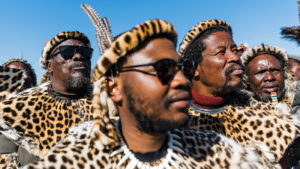On Christmas Day 2019, a mysterious North African buyer, flush with hundreds of thousands of dollar bills, allegedly arrived unannounced at a game farm owned by South Africa’s President Ramaphosa (then absent) and bought 20 buffalo from a lodge caretaker. The beasts were never claimed and no arrangements were ever made to export them.
The dollar bills — at least $580,000 worth — were shoved into a sofa for safekeeping at the lodge by staff, according to a subsequent report, and were still there two months later. That’s when an enterprising housekeeper in cahoots with a Namibian money-laundering gangster allegedly stole a chunk of the loot on 9 February 2020. President Ramaphosa, by his own evidence, had known about the transaction two months before the cash was stolen.
No public statement was ever made about the theft. No arrests have been made nor convictions secured. Had it not been for a whistleblower — one of Ramaphosa’s arch political foes — nothing would have been known publicly about the incident. It’s no wonder that the President is known by his fellow-countrymen as Cyril the Silent.
Ever since the “Farmgate” scandal was exposed, Ramaphosa has struggled to silence his critics. The row has revealed yet again the turpitude of the ruling African National Congress, and the tragic absence of any viable alternative political leadership from within the ranks of Africa’s oldest political party. It is not the incident of possible criminality that is alarming: South Africans are immured to skulduggery in both the public and private sectors, from the highest to the lowest levels. It is rather the emergence of a terrifying national question: what if President Cyril Ramaphosa goes?
Hailed as the saviour of South Africa upon election four years ago, Ramaphosa this week temporarily dodged a preliminary Parliamentary impeachment inquiry into the bizarre set of circumstances that played out on his game farm. To do so, he used a well-known legal wheeze known as “the Stalingrad Tactic”: seeking a Constitutional Court Review of the report of an independent panel of judges into the events.
It appears Ramaphosa is learning from the master: the comprehensively corrupt Jacob Zuma. The former president deployed similar diversionary and often vexatious legal tactics to keep out of both court and jail for years, in some cases decades, in a string of corruption and racketeering charges. But Ramaphosa’s party leadership does not appear fazed by the likeness — and many in the public still support him.
Such dramas are not foreign to the ANC as ruling party. President Thabo Mbeki was “recalled” (ANC weasel word for sacked) at the party conference in December 2007, allegedly because he had conspired to have his successor, Jacob Zuma, falsely charged with criminal enterprises.
Zuma was himself effectively “recalled” from any position of power in 2017, when Ramaphosa narrowly beat Zuma’s anointed successor, his former wife Nkosazana Dlamini-Zuma. Ever since, Zuma and his legions of corrupt cronies have insisted that Ramaphosa has been up to Mbeki’s old games, using the prosecutorial services and Commissions of Inquiry to stitch them up.
The culprits remain within the party, and chaos, instability and even insurrection have ensued as a painfully inadequate prosecutorial service battles to bring the crooks to court. Cyril, meanwhile, has remained silent, putting party unity before minor considerations such as booting out the bad guys. The roll recently proposed for the 80 members of the ANC’s top policy-making body — to be decided in two weeks — is rotten with ex-cons, accused criminals and assorted no-gooders. Honesty is obviously not at a high premium in the ruling party, and clearly little has changed during Ramaphosa’s tenure.
The President’s first response to the impeachment panel’s recommendation was to offer to resign before being “recalled” — an unprecedented and almost certainly mischievous move. The South African currency tanked, bonds tailspun, and thousands of ordinary citizens begged him not to go. How does one explain this response given that he is widely regarded to have failed in all his key mandates, has presided over a deterioration of the country’s fortunes by every index possible, and now even his Mr Clean image is under a cloud? The answer: there is nobody else.
The Deputy President David Mabuza, who would take over if Ramaphosa stepped down, is a nonentity chosen to balance tribal and regional forces within the ANC. He has been at the centre of multiple investigations through the years into alleged scams in the State’s land restitution programme in his home province of Mpumalanga, all dogged by mysteriously disappearing files.
The nearest rival to Ramaphosa as leader of the party, and thus next President, is Dr Zweli Mkhize, a Zumerite on the smash-and-grab wing of the movement, himself facing charges of procurement corruption during the Covid panic when he was Minister of Health.
Not surprisingly, John Steenhuisen, leader of the opposition Democratic Alliance, has called for a snap general election. The current options before the country, he said, were unacceptable: a crook for an incumbent President, a crook for a Deputy President and a crook for an aspirant President.
So what happens now? Ramaphosa, having tested the waters, has opted not to step down, thus buying valuable time and saving the country the horror of what might follow. The Elective Conference of the ANC is in two weeks. Ramaphosa is likely to succeed as party president; the ANC’s parliamentary majority will surely quash any moves to impeach him. The plot by his internal foes will fail as did their botched civil insurrection in July last year — although they will remain in the party, plotting.
The results of the investigations into the game lodge heist by South Africa’s Reserve Bank, tax authorities, police, financial control centre and immigration authorities still loom over the ANC. Worrying reports have already emerged about the stash of dollars in the sofa being part of a flood of foreign currency that came through a military air base. Many more questions remain unanswered. Is it conceivable that one of South Africa’s richest men would need to resort to money-laundering? Was the money instead intended to bail out a bankrupt party administration no longer able to rely on disenchanted corporate donors? Was it all a set-up by shadowy ex and present members of the State Security Council, once ex-president Zuma’s private fiefdom and headed by the very man who blew the stuffing out of Cyril the Silent’s sofa? If so, why did the President not say so immediately?
Meanwhile, Ramaphosa faces a bigger challenge in the form of a 2024 general election. On present showing, it seems the ANC will remain the largest party but with a minority. The latest polling gives it 42% of the vote compared to its all-time high of 72%. It will either have to seek a partner or lose out to a coalition of new forces. Such coalitions at local level have proved turbulent, short-lived and unproductive. There is little reason to believe it will be different on a national scale.
Here lies Ramaphosa’s only salvation for a second term. The support for him by the party leadership and broad sections of the public in the Farmgate scandal, desperate as it may be, gives him a mandate to cleanse his party of corruption and build modernist alliances outside the narrow base of his bankrupt organisation. Will he seize the opportunity? It’s doubtful. Is he a crook? Right now, no one dare care other than his bitterest and infinitely worse foes.
***
Order your copy of UnHerd’s first print edition here.
Disclaimer
Some of the posts we share are controversial and we do not necessarily agree with them in the whole extend. Sometimes we agree with the content or part of it but we do not agree with the narration or language. Nevertheless we find them somehow interesting, valuable and/or informative or we share them, because we strongly believe in freedom of speech, free press and journalism. We strongly encourage you to have a critical approach to all the content, do your own research and analysis to build your own opinion.
We would be glad to have your feedback.
Source: UnHerd Read the original article here: https://unherd.com/




